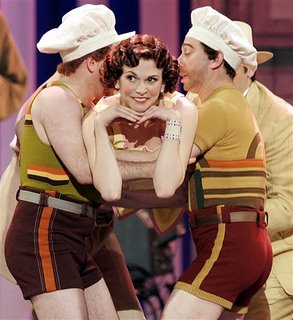 The American musical is not dead, let's get that out of the way right now! What is dead, buried and pretty much decomposing is the culture that bred the great musicals of the 1940's, the 1950's, and any other decade of the 20th century that produced the kind of lyrical theater that we have been reviving in the past twenty years. Good or bad, musicals are still being written, but they are coming from some pretty odd places (Toronto!) and are being adapted from really unusual property.
The American musical is not dead, let's get that out of the way right now! What is dead, buried and pretty much decomposing is the culture that bred the great musicals of the 1940's, the 1950's, and any other decade of the 20th century that produced the kind of lyrical theater that we have been reviving in the past twenty years. Good or bad, musicals are still being written, but they are coming from some pretty odd places (Toronto!) and are being adapted from really unusual property.Here's the real question we should be asking: Do some people feel that the Broadway musical is so dead that audiences would feel perfectly comfortable paying top dollar to attend a postmortem, postmodern Broadway recreation of a musical? The people behind The Drowsy Chaperone seem to think so, and they have cooked up a cute, totally likeable one act, no intermission diversion that explores the clumsy kind of musical entertainment to which audiences apparently flocked during the 1920's. Watching The Drowsy Chaperone is like going to a really enjoyable lecture where a nameless Theater Queen (Man in Chair) dissects a pretty unimportant work (hell, it's not even a real musical!) in ritualistic fashion for our delight.
Had I seen this show before the Tony Awards, I would have concluded that what creator Bob Martin had in mind was simple homage to a genre he loves, and I would have left it at that. After listening to his Tony Award speech, things became a little more complex, and I concluded that all he had in mind was pure satire. Let's make fun of that second-rate entertainment by those third-rate composers and while we are at it, let's also do a hatchet job on that weird pack that just goes wild over them! Did he not mention in his speech the fact that his Tony Award will now give him a further chance to poke fun of even more musicals? I'm not surprised: Mr. Martin is an alumnus of Second City from Toronto, and this kind of biting satire is their middle name.
Although for true satire to work, a society must have a clear idea of what is being satirized, (and I am not sure how many in the audience were well versed with early 20th century musicals) on one level, I enjoyed The Drowsy Chaperone, although as most people, my knowledge of 1920's shows is quite limited. While enjoying the show, I thought of The Cocoanuts, the Irving Berlin musical that is only remembered today because it was one of The Marx Brothers' biggest Broadway hits, and served as the vehicle for their first film for Paramount Pictures. Later on, in the 1940's, when the brothers moved to MGM (minus Zeppo who became their agent) and made A Night at the Opera, they did to Verdi's Il Trovatore what should be done to Verdi's Il Trovatore, and everybody had a good laugh doing it. Think of The Drowsy Chaperone in this same vein: Bob Martin is doing to The Cocoanuts what could be done to The Cocoanuts; except that he does it with a sharper hatchet, and with songs and lyrics that may not match the style of the times, but which do match the quality of the original music of some of these shows of that time (The Cocoanuts might be the only Irving Berlin musical that does not have a single hit). Just don't expect the same artistic level as the Marx Brothers, and you'll be fine.
The ensemble cast is excellent. Alluding to one of the lines in the show: they all do well with their two dimensional characters in the well-worn plot. Sutton Foster and Tony Award winner Beth Leavel, in the title role, are particularly memorable, but so are Garth and Jason Kravits who play two funny gangsters, and Danny Burstein who plays an oily Latin lover character called Adolpho -- a cross between Rudolph Valentino and Cesar Romero on a bad day.
But it is all Bob Martin's show. As our host he allows us to enter the brain of the Man in Chair. What we find there is a bit complex and really sweet. Watching the show I thought how interesting it would be if the characters that he had conjured suddenly took arms against their creator, giving way to a kind of Luigi Pirandello situation with forgettable songs. Alas, that would not be this kind of a Broadway musical (maybe a Stephen Sondheim musical), and certainly not the kind of fluff that our host is captivated by, and with which he entertains us for a little under two hours.
No comments:
Post a Comment